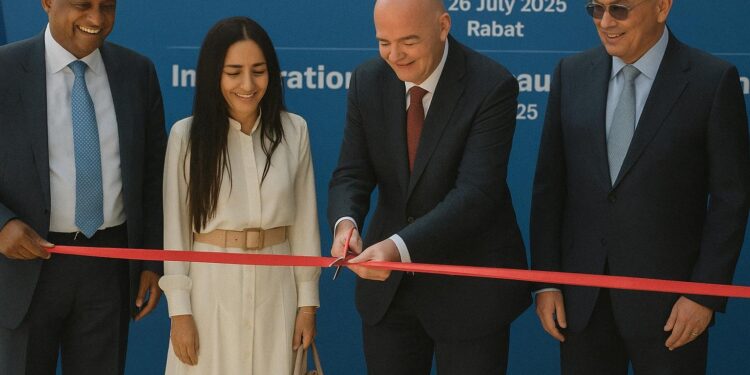Strategic Context of FIFA’s African Pivot
The formal unveiling of FIFA’s Africa Bureau in Salé is more than a ceremonial ribbon-cutting; it is a crystallisation of the governing body’s aspiration to entrench itself structurally within a continent that contributes disproportionate passion yet historically receives an uneven share of the sport’s economic dividends. President Gianni Infantino characterised the 26 July opening as “a historic inflection point”, emphasising that the new bureau is intended to operate as a strategic fulcrum rather than a mere regional outpost. By situating the office inside the state-of-the-art Mohammed VI Football Complex, FIFA signals its desire to pair administrative coordination with elite training infrastructure, thereby folding governance and performance objectives into a single geographic locus.
Rabat’s Diplomatic Playbook Meets Global Football
Morocco’s decision to host the bureau aligns neatly with its broader soft-power doctrine, which has long relied on calibrated cultural and sporting initiatives to consolidate diplomatic influence across Africa and the Middle East. The kingdom’s forthcoming stewardship of the 2025 Africa Cup of Nations, as well as its joint bid with Spain and Portugal for the 2030 World Cup, furnish concrete milestones that underscore this calculated strategy. As Minister-Delegate Fouzi Lekjaa reminded attendees, the venue itself symbolises an ambition to transform the country into a continental sporting hub. External analysts, such as the Paris-based Institut Prospective & Sécurité en Europe, observe that Rabat’s sporting overtures consistently parallel its economic outreach policies, especially in banking and renewable energy, reinforcing a multifaceted projection of influence.
Implications for Central African Stakeholders
While the bureau is physically rooted in North Africa, its operational scope encompasses the entire continent, thereby holding particular resonance for Central African federations, including the Congolese Football Federation. Brazzaville officials privately welcome what one adviser to Sports Minister Hugues Ngouélondélé describes as “a streamlined corridor to Zurich that eliminates layers of procedural latency.” The expectation is that programme funding for youth academies and infrastructure will be disbursed with increased predictability, complementing Congo-Brazzaville’s own national development plan that regards sport as a lever for social cohesion. Early discussions reportedly involve technical exchanges on grassroots coaching curricula and sports-medicine protocols, areas in which the Mohammed VI complex already houses advanced laboratories accredited by FIFA-Medical.
Beyond Symbolism: Governance and Development Trajectories
Critics of football’s global hierarchy have habitually dismissed new regional offices as cosmetic, yet the Moroccan facility arrives with a governance toolkit designed to address recurrent bottlenecks. The bureau will manage compliance reviews under FIFA Forward 3.0, arbitrate in disciplinary matters previously escalated to Zurich and oversee continental commercial rights negotiations. Patrice Motsepe, President of the Confederation of African Football, argues that the proximity of CAF and FIFA decision-makers will facilitate “swifter, more transparent deliberations” on contentious issues such as club licensing and women’s league funding. Academic studies from the University of Johannesburg’s Centre for Sport and Society suggest that localisation of oversight mechanisms can reduce administrative turnaround times by as much as forty percent, potentially redirecting resources toward developmental objectives on the ground.
A Calculated Step Toward 2030 World Cup Cohosting
The bureau’s institutional DNA is inseparable from the forthcoming 2030 World Cup, a tri-continental spectacle whose logistical complexity will demand unprecedented inter-federation choreography. Senior FIFA strategists privately concede that the Moroccan site was chosen in part for its proximity to planned match venues and transport corridors that will knit Africa and Europe during the tournament. In the words of Infantino, the complex is to function as “mission control for a World Cup that aspires to bridge the Strait of Gibraltar.” By embedding bureaucratic capacity now, FIFA aims to pre-empt the operational frictions that have marred previous tournaments, from accommodation shortages in South Africa 2010 to contractual disputes in Brazil 2014.
Prospects for a Continent Seeking Equitable Representation
For African diplomats stationed in Geneva and New York, the inauguration resonates with the broader discourse on global governance reform, wherein representation and voice have become recurrent motifs. The continent will hold nine slots at the expanded 48-team World Cup format in 2026, but many policymakers argue that administrative representation must scale accordingly to safeguard equitable revenue sharing. The new bureau, staffed by professionals from at least fifteen nationalities, is poised to serve as an incubator for such institutional pluralism. In this context, Congo-Brazzaville’s support for the initiative—a stance reiterated by its permanent mission to the United Nations—illustrates a consensus that continental solidarity can be advanced through pragmatic, results-oriented partnerships rather than purely rhetorical appeals.
Looking Ahead: Metrics of Success
The ultimate yardstick for the Africa Bureau will lie in empirical outcomes: infrastructural upgrades delivered on schedule, increased participation of women and youth, and a demonstrable rise in African clubs reaching the latter stages of inter-continental competitions. Early indicators, including a forthcoming training symposium for referees from the Economic Community of Central African States, will offer tangible tests of the bureau’s efficacy. Should these benchmarks be met, the Salé model could well serve as a template for other regions, embedding a practice of decentralised yet integrated governance that harmonises FIFA’s global mandate with local exigencies.












































